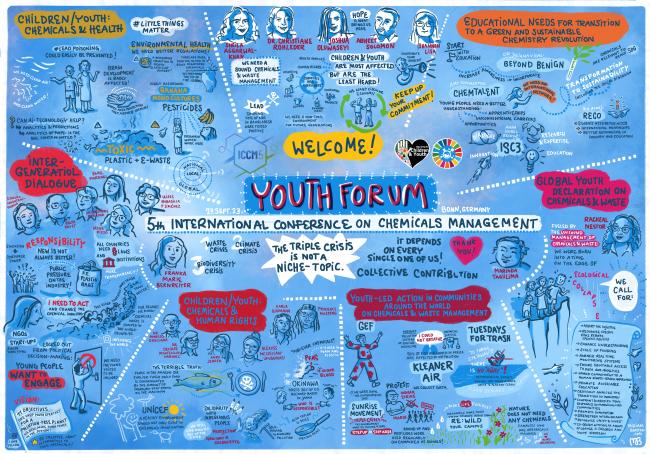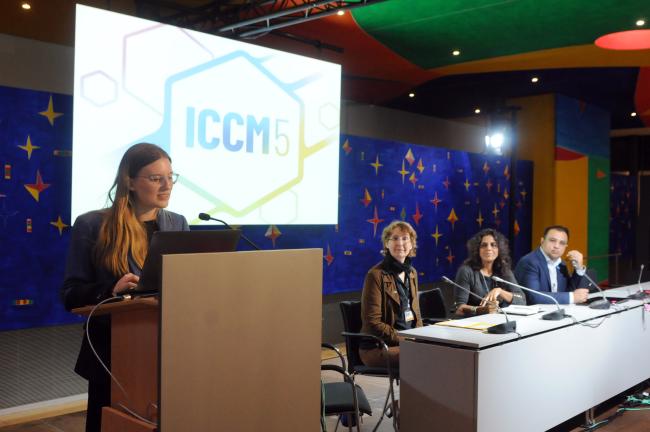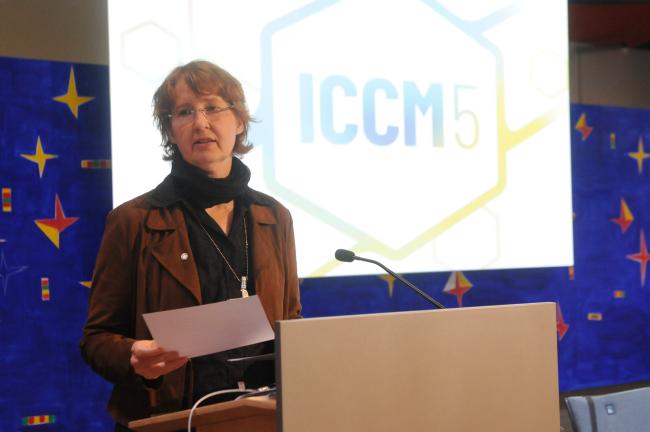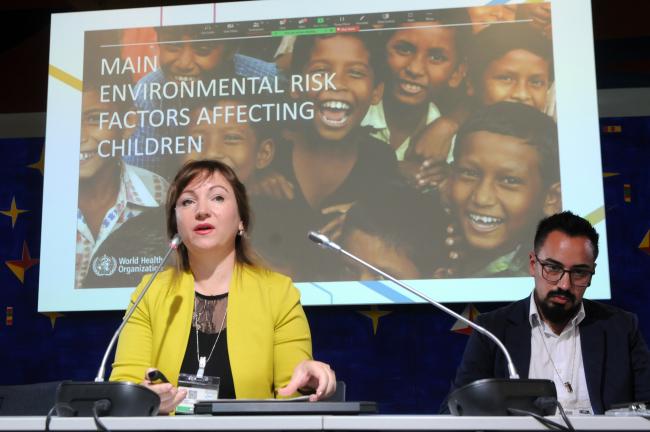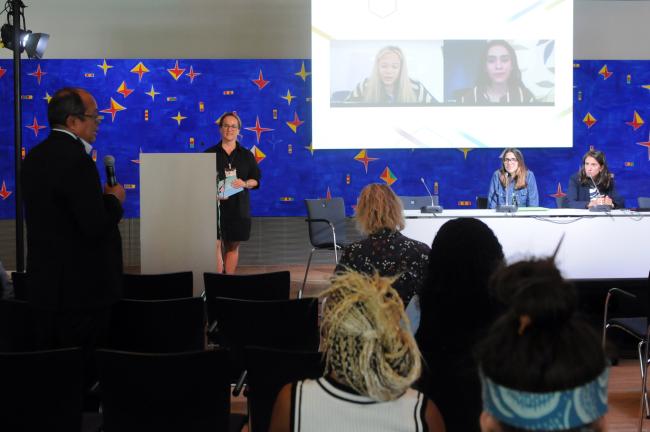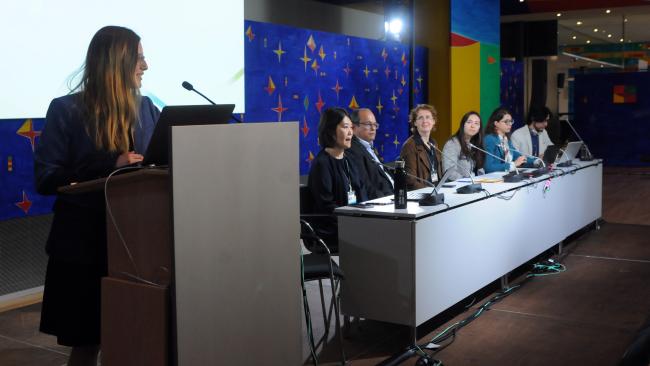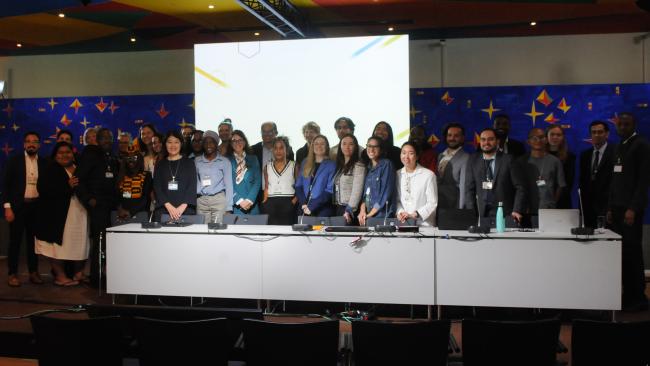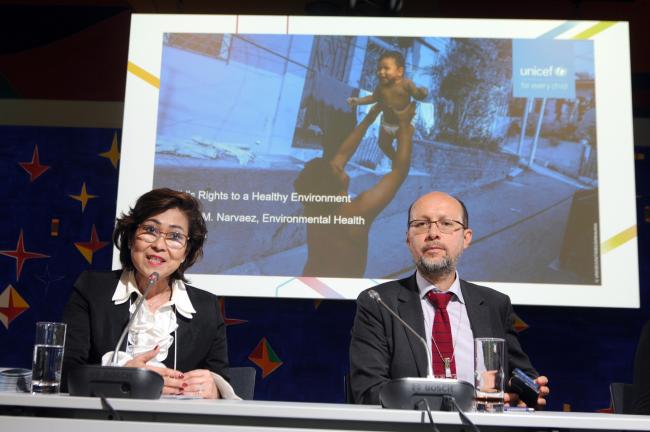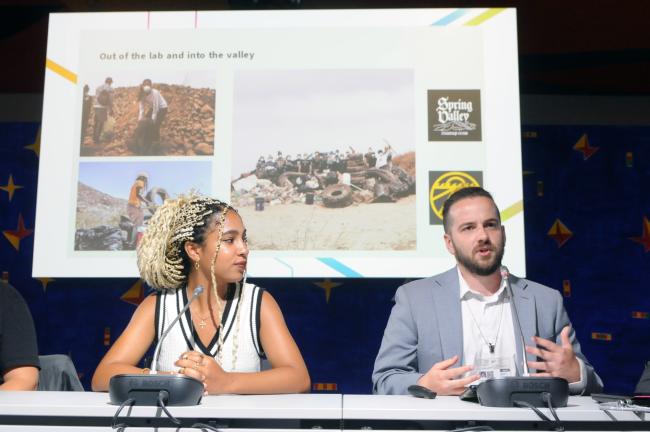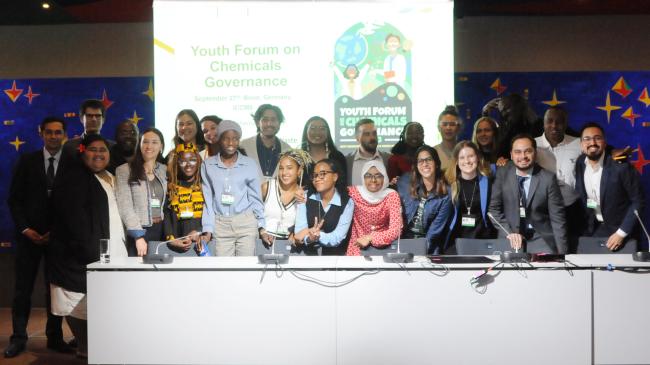About
This UN Major Group for Children and Youth-convened side event aimed to engage youth in the design, implementation, monitoring, follow-up, and review of chemicals and waste policies at all levels.
Children and young people are hurt the most and often heard the least with respect to chemicals and waste management. The Chemicals and Waste Youth Platform, convened by the UN Major Group for Children and Youth, originated in 2021. It focuses on chemicals, waste, and pollution, with the goal of engaging youth in the design, implementation, monitoring, follow-up, and review of chemicals and waste policies at all levels. Initiated by a vision among interns working for the Strategic Approach to International Chemicals Management (SAICM), the platform grew quickly with more than 600 participating youth organizations and individuals from around the world.
The first-ever Youth Forum on Chemicals and Waste took place in Bonn, Germany, as a special event of the fifth session of the International Conference on Chemicals Management (ICCM5), in collaboration with the government of Germany and the SAICM Secretariat. Sessions included four thematic panel presentations, and a moderated intergenerational dialogue between youth and key decision makers.
Opening of the Youth Forum
The Youth Forum’s opening session, moderated by Shannon Lisa, Chemicals and Waste Youth Platform Global Focal Point, included four keynote addresses and set the scene for the day’s deliberations.
Sheila Aggarwal-Khan, UN Environment Programme (UNEP), addressed youth as agents of change, inviting them to consider whether alternatives exist, including opportunities in green and sustainable chemistry. She urged youth to evolve their advocacy role and hold policymakers and decision makers accountable.
Christiane Rohleder, State Secretary, Federal Ministry for the Environment, Nature Conservation, Nuclear Safety and Consumer Protection (BMUV), Germany, underscored that youth will be affected the most from today’s policies and can benefit from solutions. She welcomed their energy, knowledge, and commitment to bring about change.
Abheet Solomon, UN Children's Fund (UNICEF), focused on global inequities, stressing that 92% of all pollution-related deaths occur in low- and middle-income countries. He shared survey results showing lead poisoning disproportionately affecting children in the developing world. He emphasized that the problem of chemicals and waste is solvable as long as everyone contributes, adding that the actions of youth are a sign of hope.
Joshua Gabriel Oluwaseyi, LEARNBLUE, shared his organization’s efforts to inspire young people to take individual and collective action on global issues such as climate change and air pollution. He stressed the need to include youth as meaningful participants in discussions and decisionmaking.
Children, Adolescents and Their Exposure to Toxic Chemicals: Environmental Health Case Studies and Priorities
This panel discussion, moderated by Afra Farveen, University of Manchester, brought together young health professionals, scientists, and children’s health-focused advocates and agencies to share their experiences on chemical risks.
Elena Jardan, WHO, addressed the WHO’s estimates on the burden of disease and stressed that 1.6 million deaths in children under five were linked to the environment in 2016 alone. Emphasizing that most negative impacts are preventable, she focused on the WHO’s work on children’s health and the environment, including the International Lead Poisoning Prevention Week, which takes place the third week each October.
Via video, Kam Sripada, Norwegian University of Science and Technology, and Little Things Matter, urged a systems change, underscoring that individual choices do not suffice. She emphasized that children are particularly vulnerable and exposed to many chemicals, and regulating one chemical at a time is disconnected from reality.
Salah Abudu, University of Ghana, Purim African Youth Development Platform, shared personal experiences on her trajectory from the street markets in Accra, Ghana, to advocacy for environmental health, including chemicals and waste management. She identified insufficient funding and lack of enforcement and awareness as major challenges.
Luis Diego Palomo, National University of Costa Rica, shared results from the Infants Environmental Health Study, a birth cohort undertaken in rural Costa Rica that focuses on the effects of pesticides and manganese on growth neurodevelopment and the respiratory system.
Via video, Maria Jose Talayero Schettino, Mundo Quimico and George Washington University, addressed lead poisoning in Mexico and its cultural dimension since the main source of exposure is the use of glazed clay pottery. She stressed that prevention is key, lamenting that current regulations fail to protect children as the most vulnerable to chemical exposure.
Amy Summerton, Chemical Industries Association (CIA) Young Ambassador, virtually, described her apprenticeship education in the chemicals industry, saying this can help prepare youth for a career in STEM.
Anna Isabel Becker, International Sustainable Chemistry Collaborative Centre (ISC3), said her organization’s mission is to raise awareness of sustainable chemistry for a sustainable world, through a multistakeholder approach in four areas: policy and stakeholder dialogue; research and expertise; entrepreneurship and innovation; and education and training.
Ola Alhaj Founder, RECO Environmental Project, Syria, and Youth Platform MENA Chemicals and Waste Focal Point, virtually, highlighted challenges for green and sustainable chemistry in the midst of turmoil and devastation. She said, while rebuilding physical infrastructure and meeting development needs, lack of resources such as textbooks, outdated and poorly maintained laboratories, and brain drain hinder progress.
Other points included:
- Industry has a bad reputation but is working on sustainability.
- International collaboration is needed to empower the youth needed for a “green industrial revolution,” particularly in poorer regions.
- Dialogues with youth should become permanent fixtures in political processes.
- More chemistry education is needed for achieving the SDGs.
- Chemistry starts at home, to understand how it impacts our daily lives.
Intergenerational Dialogue
Shannon Lisa, Chemicals and Waste Youth Platform Global Focal Point, moderated the dialogue.
Kakuko Nagatani-Yoshida, UNEP, noted Kenyan children’s lack of knowledge about Kenya’s rich fauna due to lack of access by car to national parks, and emphasized consumer awareness and purchasing power to make harmful products unprofitable.
Rolph Payet, Executive Secretary, Basel, Rotterdam and Stockholm Conventions, said people must gain an understanding when very young. He urged using traditional bags instead of plastic and soap instead of phosphate- and chemicals-ridden shower gel.
Christiane Rohleder, State Secretary, BMUV, called for: scientific research for better decision making; laws and institutions for managing chemicals, given that more than 100 countries have none; and a halt to exports of substances banned in the countries that produce them.
Rahel Marschall, GreenCHEM and Chemicals and Waste Youth Platform, described his work on programmes for teaching green chemistry. He called for age- and gender-disaggregated studies on climate impacts, better regulations, and education of youth on chemicals and their dangers.
Irene Rizzo, Minamata Convention Secretariat, stressed human rights regarding chemicals and waste management, with a “human face” approach focusing on human health.
Ulises Bobadilla y Jimenez, Latin American and Caribbean Chemicals and Waste Youth Platform Regional Focal Point, said youth have the most “skin in the game” but the least voice, being locked into a world of waste but locked out of political processes to address it.
Panelists also noted the need for:
- incentives and alternatives to harmful products such as inorganic fertilizers and pesticides and greater understanding of their long-term harm; and
- data-gathering, particularly on chemicals’ effects on health.
The Right to a Toxic-Free Environment for Children and All Generations
This panel discussion was moderated by Sadullo Ishankulov, Youth-Led Initiative Association in Tajikistan.
Marcos Orellana, UN Special Rapporteur on toxics and human rights, emphasized that the field of human rights and the environment continue to evolve due to the activism and experiences of people like the Youth Forum’s participants. He highlighted recent developments, including recognition of the human right to a clean, healthy, and sustainable environment and General Comment No. 26 on children’s rights and the environment by the UN Committee on the Rights of the Child, stressing they should guide our efforts towards a sustainable future.
Desiree Montecillo-Narvaez, UNICEF, underscored that the right to a healthy environment is inherent in the UN Convention on the Rights of the Child. She outlined categories of environmental hazards and developments in global environmental governance, and focused on UNICEF’s areas of intervention, including the Healthy Environments for Healthy Children Global Programme Framework.
Anpo Jensen, North American Focal Point of Global Indigenous Youth Caucus and International Indian Treaty Council, highlighted efforts to address environmental challenges facing the Lakota People. She noted that the Homestake Gold Mine, which operated in the Black Hills from 1886-2002, was the largest gold mine in North America and led to mercury contamination. She discussed research activities under the Black Hills Water Testing Project, highlighting Indigenous rights stemming from the UN Declaration on the Rights of Indigenous Peoples (UNDRIP) and the Lakota Treaty.
Karla Giovanna, Amazonian Youth Cooperation for Sustainable Development (COJOVEM), discussed her organization’s work on research, advocacy, and education. She highlighted challenges for people living in the Amazon, including fish with high levels of toxic heavy metals, and urged policymakers to trust the knowledge, talent, and passion of youth in the Amazon.
Prudence Masseng, Young Volunteers for Environment Cameroon and IPEN Youth Caucus, discussed exposure of children to harmful chemicals and the role of international chemical organizations and treaties in safeguarding human rights globally.
Alexyss McClellan-Ufugusuku, Association of Comprehensive Studies for Independence of the Lew Chewans (ACSILs) and University of California Santa Cruz, discussed the challenges of the Ryukyuan People, a Japonic-speaking East Asian ethnic group native to the Ryukyu Islands. She provided a brief history of the Okinawa Island hosting 32 US military installations and then focused on per- and polyfluoroalkyl (PFAS) contamination in Okinawa, linked to fire-fighting foams from the military bases leaking into the groundwater and rivers.
Youth-Led Action on Chemicals and Waste in Communities Around the World
This panel discussion, moderated by Maria Szczerbowska, BeLocal, showcased youth-led initiatives, organizations, and movements that have been successful in shaping safe, responsible chemicals and waste management in different regional contexts.
Anil Bruce Sookdeo, Global Environment Facility (GEF), focused on the GEF’s work in youth engagement. He highlighted youth engagement in the last GEF replenishment, and growing partnerships with civil society, including youth constituencies. He underscored support for youth participation, including at the GEF Assembly in August 2023 and the Gustavo Fonseca Youth Conservation Fellowship Program, as well as innovative initiatives focusing on youth engagement in sustainable fashion and construction.
Sharona Shnayder, Tuesdays for Trash, said her organization went from trash collection to advocacy directed toward waste management authorities, including for funding allocations, deposit systems, and legislation. She noted nothing is thrown “away,” citing the environmental impact of methane-releasing trash and health impacts on humans and animals.
Sheina Louise Crystal, Re:wild Your Campus, described Re:wild’s work to deter US educational institutions from using synthetic hazardous fertilizers and pesticides. She noted dangers to child-bearing-age women and a personal protective equipment (PPE)-wearing groundskeeper’s successful lawsuit after contracting non-Hodgkin’s lymphoma from RoundUp. She summarized Re:wild’s different “Green Grounds Certified” labels for: Integrated Pest Management; toxic product product-swapping for others; organic landcare; and rewilding.
Purity Christine Achieng Ouma, Kleaner AIR, said her air pollution-associated childhood asthma led to a data-driven decision-making app that analyzes air, presenting results accessibly to policymakers to encourage commitments to tackle air pollution. She pointed to pollution-associated medical costs affecting budgets.
Solongo Otgonbayar, Founder, 3% Segregate Medicinal Waste, described her organization’s efforts to eliminate medical waste from sewage systems and general waste by persuading pharmacies to emplace collection boxes and dispose of the collected wastes, citing their social responsibility.
Adam Cooper, Sunrise Movement San Diego, described two organizations’ toxic trash cleanup leading to advocacy that resulted in a new “American Climate Corps.” He called on older people to step up and join young people in eliminating pollution or step aside.
Closing Remarks
Moderator Shannon Lisa, Chemicals and Waste Youth Platform Global Focal Point, noted the Youth Forum, which convened all day, was almost unprecedented.
Franka Marie Bernreiter, UN Youth Delegate on Sustainable Development, Germany, called for youth action on transformational change.
Marinda Imakulata Tagiilima, Global Youth Biodiversity Network (GYBN), noted everyone has a role, both working on the ground and enhancing the global conversation.
Moderator Lisa closed the forum’s deliberations, expressing hope of making this inaugural Youth Form permanent.
The Youth Declaration on chemicals and waste will be presented to the High-Level segment of ICCM5.
Text written and edited by Asterios Tsioumanis, Ph.D., Deborah Davenport, Ph.D., and Leila Mead.
All ENB photos are free to use with attribution. For this event please use: Photo by IISD/ENB | Diego Noguera.
To receive free coverage of global environmental events delivered to your inbox, subscribe to the ENB Update newsletter.
Children, Adolescents and Their Exposure to Toxic Chemicals: Environmental Health Case Studies and Priorities

Moderator Afra Farveen, environmental youth activist and environmental science graduate at the University of Manchester

Participants listen to the introductory remarks by Afra Farveen, environmental youth activist and environmental science graduate, University of Manchester.

Salah Abudu, Public health student, University of Ghana and Purim African Youth Development Platform

